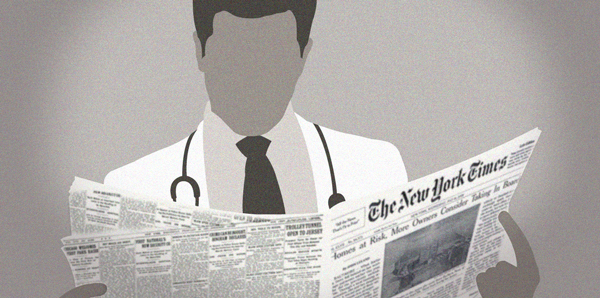We cannot breathe a sigh of relief deep enough to adequately express how glad we are to be cutting the red tape that surrounds traditional healthcare. More specifically, HIPAA. Its rules and regulations are so convoluted that people don’t know which way is up… and that leads to interrupting a private conversation in a hospital cafe reprimanding the wife of a dying cancer patient for speaking publicly about a patient. Baffled yet? Yup, so were we.
An article posted recently on the NY Times gave several instances where HIPAA was misunderstood, and the consequences could have been dire. Take Ericka Gray’s story, for example:
In 2012, Ericka Gray repeatedly phoned the emergency room at York Hospital in York, Pa., where her 85-year-old mother had gone after days of back pain, to alert the staff to her medical history. “They refused to take the information, citing Hipaa,” said Ms. Gray, who was in Chicago on a business trip.
“I’m not trying to get any information. I’m trying to give you information,” Ms. Gray told them, adding that because her mother’s memory was impaired, she couldn’t supply the crucial facts, like medication allergies.
By the time Ms. Gray found a nurse willing to listen, hours later, her mother had already been prescribed a drug she was allergic to. Fortunately, the staff hadn’t administered it yet.
Now, we get what HIPAA is trying to do: keep personal health information private. And that’s a noble gesture. But there are so many hoops to jump through just to get it right that there ends up being more ways to get it wrong. In the DPC world, we love communicating with our patients how they prefer. They give us consent to text, even Tweet about their needs. We don’t go blabbing their story all over the place, but it sure is nice to email a patient back and forth on their schedule and know I’m providing exactly the kind of care they need at that moment. You can’t develop that kind of trusting patient-doctor relationship when you’re scared to whisper about a condition because you’re afraid it might be a HIPAA violation.
The NY Times article goes into detail about what is and isn’t allowed according to HIPAA. But we’re saying if we never have to deal with a situation like this commenter shared in our lifetimes, that wouldn’t be soon enough:
Our 14 year old was traveling with family friends in North Carolina. One night suddenly he became [sic] delerious, unable to walk and high fever. Taken to the emergency room by ambulance. My friend called me, five states away. The emergency room physician and head nurse each refused to speak with me on the phone, citing Hipaa, and saying I should have had the [sic] forsight to give a signed letter for permission anticipating [sic] somehting might happen. I was out of my mind with worry that he was dying of meningitis. The person from United airlines who arranged for a flight in the middle of the night was more helpful. Yes all ended well but it was truly horrible.
We think what all this boils down to is having more time to build real relationships with our patients. In our 45 minute appointments, we’ll probably have plenty of time to talk about their upcoming trip, and discuss how medical decisions should be made while they’re away. They can ask, we can tell, and everyone’s head is clearer for it. Being denied the right to obtain your own medical chart is for the birds, and we think our DPC patients would agree.
